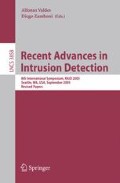Abstract
A popular class of host-based Intrusion Detection Systems (IDS) are those based on comparing the system call trace of a process against a set of k-grams. However, the detection mechanism in such IDS can be evaded by cloaking an attack as a mimicry attack. In this paper, we give an algorithm that transforms a detectable attack into a mimicry attack. We demonstrate on a number of examples that using this algorithm, mimicry attacks can be easily constructed on self-based IDS with a set of k-grams and also a more precise graph profile representation. We enhance the IDS by making use of the system call arguments and process credentials. To avoid increasing the false positives, a supplied specification is used to abstract the system call arguments and process credentials. The specification takes into account what objects in the system that can be sensitive to potential attacks, and highlights the occurrence of “dangerous” operations. With this simple extension, we show that the robustness of the IDS is increased. Our preliminary experiments show that on our example programs and attacks, it was no longer possible to construct mimicry attacks. We also demonstrate that the enhanced IDS provides resistance to a variety of common attack strategies.
Access this chapter
Tax calculation will be finalised at checkout
Purchases are for personal use only
Preview
Unable to display preview. Download preview PDF.
References
Hofmeyr, S., Forrest, S., Somayaji, A.: Intrusion detection using sequences of system calls. Journal of Computer Security 6, 151–180 (1998)
Somayaji, A., Forrest, S.: Automated response using system-call delays. In: Proceedings of the 9th USENIX Security Symposium (2000)
Somayaji, A.: Operating system stability and security through process homeostasis. Ph.D. Thesis, University of New Mexico (2002)
Warrender, C., Forrest, S., Pearlmutter, B.: Detecting intrusions using system calls: alternative data models. In: Proceedings of the 1999 IEEE Symposium on Security and Privacy (1999)
Wagner, D., Soto, P.: Mimicry attacks on host-based intrusion detection systems. In: Proceedings of the 9th ACM Conference on Computer and Communications Security (2002)
Tan, K.M.C., Killourhy, K.S., Maxion, R.A.: Understanding an anomaly-based intrusion detection system using common exploits. In: Wespi, A., Vigna, G., Deri, L. (eds.) RAID 2002. LNCS, vol. 2516, p. 54. Springer, Heidelberg (2002)
Tan, K.M.C., Maxion, R.A.: Determining the Operational Limits of an Anomaly-Based Intrusion Detector. IEEE Journal on Selected Areas in Communications, Special Issue on Design and Analysis Techniques for Security Assurance 21(1), 96–110 (2003)
Tan, K.M.C., Maxion, R.A.: Why 6? Defining the operational limits of stide, an anomaly-based intrusion detector. In: Proceedings of the 2002 IEEE Symposium on Security and Privacy (2002)
Gao, D., Reiter, M.K., Song, D.: On gray-Box program tracking for anomaly detection. In: Proceedings of the 13th USENIX Security Symposium (2004)
Sekar, R., Bendre, M., Dhurjati, D., Bollineni, P.: A fast automaton-based method for detecting anomalous program behaviors. In: Proceedings of the 2001 IEEE Symposium on Security and Privacy (2001)
Feng, H., Kolesnikov, O., Fogla, P., Lee, W., Gong, W.: Anomaly detection using call stack information. In: Proceedings of the 2003 IEEE Symposium on Security and Privacy (2003)
Maxion, R.: Masquerade detection using enriched command lines. In: Proceedings of the International Conference on Dependable Systems & Networks, DSN 2003 (2003)
Kruegel, C., Mutz, D., Valeur, F., Vigna, G.: On the detection of anomalous system call arguments. In: Snekkenes, E., Gollmann, D. (eds.) ESORICS 2003. LNCS, vol. 2808, pp. 326–343. Springer, Heidelberg (2003)
Giffin, J., Jha, S., Miller, B.: Efficient context-sensitive intrusion detection. In: Proceedings of the 11th Network and Distributed System Security Symposium (2004)
Provos, N.: Improving host security with system call policies. In: Proceedings of the 12th USENIX Security Symposium (2003)
Pevzner, P.A.: L-tuple DNA sequencing: computer analysis. Journal of Biomolecular Structure and Dynamics 7, 63–74 (1989)
Aho, A.V., Ullman, J.D.: Foundations of Computer Science: C edn. W.H. Freeman & Co, New York (1995)
Bernaschi, M., Gabrielli, E., Mancini, L.V.: REMUS: A security-enhanced operating system. ACM Transactions on Information and System Security 5(1), 36–61 (2002)
Garfinkel, S., Spafford, G.: Practical Unix Security, 2nd edn. O’Reilly and Associates, Sebastopol (1996)
Author information
Authors and Affiliations
Editor information
Editors and Affiliations
Rights and permissions
Copyright information
© 2006 Springer-Verlag Berlin Heidelberg
About this paper
Cite this paper
Sufatrio, Yap, R.H.C. (2006). Improving Host-Based IDS with Argument Abstraction to Prevent Mimicry Attacks. In: Valdes, A., Zamboni, D. (eds) Recent Advances in Intrusion Detection. RAID 2005. Lecture Notes in Computer Science, vol 3858. Springer, Berlin, Heidelberg. https://doi.org/10.1007/11663812_8
Download citation
DOI: https://doi.org/10.1007/11663812_8
Publisher Name: Springer, Berlin, Heidelberg
Print ISBN: 978-3-540-31778-4
Online ISBN: 978-3-540-31779-1
eBook Packages: Computer ScienceComputer Science (R0)

